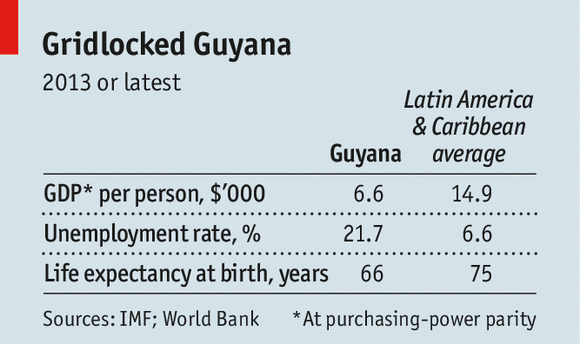Proroguing parliament is a legitimate constitutional device in Westminster constitutions, whatever its origins and the purpose for which it is used. Much of the time prorogation has been used for partisan purposes, has been unpopular and has incurred much opposition. The Governor prorogued the legislature in 1963 to cause the lapse of the Labour Relations Bill, which would have resulted in a poll in the sugar industry and ultimate recognition of the PPP aligned GAWU to represent sugar workers.
The President said that the objective of prorogation is to prevent confrontation and encourage consultation. The opposite will be the result. The Government’s life has come to a natural end because stalemate reigns everywhere. The renewal of the Government’s mandate, not perpetuation of its life, was the solution. A national unity government is another.
A political storm has been unleashed. The Opposition has declared that further talks with the Government would be useless and has taken to the streets in peaceful protest. If the Government attempts to continue the prorogation beyond March 31, 2015, when its normal power to spend runs out and a budget would be due, it risks increased agitation.
The Government had opportunities to arrive at compromises with the Opposition. Before the AFC tabled its motion, it offered a ten-point programme to the Government for discussion. The Government said ‘bring it on.’ By not engaging with the AFC’s offer, it left APNU with no option but to support the AFC’s proposed no confidence motion.
APNU then started its own campaign for local government elections. It had to tactically maintain its support for the no confidence motion but it was evident that APNU could not support both local government elections and the no confidence motion at the same time. It was a distinct possibility, therefore, that if a date for local government elections were to have been agreed to, APNU would have had to adjust its position vis-à-vis the no confidence motion. This was an opportunity for the Government to seize.
But President Ramotar squandered the opportunity by publicly announcing that it would be foolish of him to set a date while APNU maintained its support for the motion. The President thereby withdrew from APNU the option of persuading the AFC to withdraw the motion, which it would have been forced to do if APNU had discontinued its support. Creative maneuvering by the Government to eliminate the threat of or neutralize the no confidence motion was sorely lacking.
Repeated discussions on the contentious the anti-money laundering legislation have been exhaustive. APNU’s condition for support, namely, the presidential assent to the bills passed by the Opposition and the AFC’s condition for support, namely, appointment of the Procurement Commission were both rejected by the Government even though compromises were floated in each case. The Government has refused to meaningfully negotiate on the budget. The Opposition has concluded that the Government’s idea of dialogue is capitulation.
In these circumstances, no one can seriously believe, that having shut down the National Assembly, the main forum through which the Opposition speaks to the people of Guyana, that it will be in any mood for further unproductive talks. It would have been more useful for the business community and others to direct their attention instead to where they know that Guyana should go from here – elections or a national unity government.
The business community has loyally supported PPP/C governments since 1992. They have flourished because the PPP/C has provided stable, majority, governments even within the context of the divisions in our society. But all minority governments, like today’s PPP/C Government, are by nature unstable, with a short lifespan. The business community, which has gained much and has much to protect, knows and must publicly recognize the vital need to restore political stability.
The business community must join the call for the only alternative to the impasse, a national unity government, which would restore stability and see the Government serve out its term. The Opposition must put this squarely, face to face, to all those calling for dialogue – the business community, FITUG and the religious community – and must challenge them to take a public stand, as they so willingly did on the issue of dialogue and on other issues supportive of the Government. The organisations must invite the Government to put the issue of a national unity government on the table, restore parliament and then invite the Opposition for discussions on that issue.
The statistics below are taken from a recent article on Guyana in the Economist. Writing on the prorogation issue, it demonstrated the effects of 60 years of political instability in Guyana. The conclusion was clear that Guyana will continue to lag behind and its people will continue to be plagued by poverty unless political instability is ended.

Sick. I was always annoyed when we were aligned with the Haitian condition..no more. I can see a fast plummet to the bottom.